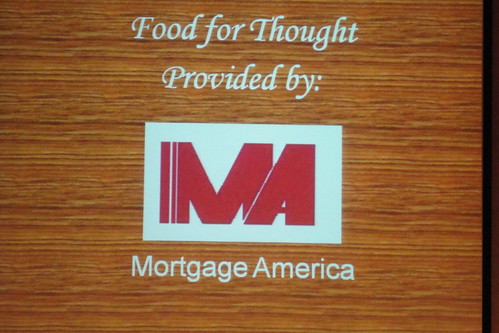Not long ago, mortgage companies started to offer a smorgasbord of programs to make home ownership easily available to almost everyone. Some of the common terms we have become accustomed to hearing include:
- Low-Doc
- No-Doc
- Full-Doc
- 100% LTV
- Interest Only
- ARM
- Conforming
- Non-Conforming
The housing market has been red-hot for many months, but we are realizing that all these short-term "solutions" have become long-term "problems". For instance, if a potential borrower had a decent credit score, they could obtain a "No-Doc" loan...which meant that they didn't have to submit documentation proving employment, income or debts.
Not only that, but there were the "interest-only" loans, where people could qualify at a very low "teaser" rate...only to find themselves faced with the higher rate within just a few months.
And, can you even imagine giving someone a loan at 125% of the value of their home? It's crazy! This is a recipe for bankruptcy if I ever saw one. Once they have used this money, it's gone. And when they get into trouble, they can't even sell the home without bringing a substantial amount of money to the closing table. Since most people don't have a huge amount of cash laying around, they are a candidate for bankruptcy or foreclosure. These loans should never have been allowed in the first place.
Many mortgage companies offered "adjustable teaser rates" - which meant that the borrower started out with a low interest rate (perhaps for the first year or so)...then jumped to the higher rate, which meant that several times during the life of the loan, their mortgage payment would increase dramatically.
It's so easy to buy a new home with low payments, and many borrowers just don't realize what the higher payments will do to their budget. I wonder who was there to counsel these homebuyers? Who was there to remind them of what was going to happen in a few months? I consider it my obligation to discuss this with my homebuying clients to make sure they understand the ramifications of this type of financing. As an Exclusive Buyer's Agent, part of my job is to counsel my clients in every aspect of their purchase.
Now, because of many of these loan programs, we are facing major foreclosures. Mortgage companies are folding and the entire industry is undergoing a major meltdown.
The bills are coming due! The delinquency rate on low-quality mortgages is at 13.8%, and the rate has doubled on medium-quality mortgages. Foreclosures are at an all-time high! Many areas of the country have real estate markets in the tank...and may take years to recover.
At least 82 high-risk lenders have re-organized or folded, resulting in huge loan losses. Many lenders are not closing on loans they have committed to. If you are in the process of purchasing a home, it would be to your benefit to check with other lenders in case your chosen lender cannot close on your loan. Many companies are simply cancelling loans and in many cases the homebuyer has to start over with a new lender. This can result in the homebuyer having to pay for another appraisal if the new lender won't accept their current appraisal.
The Bottom Line! Basically, if you are purchasing a new home and have solid employment, a good FICO score and at least 5% of the purchase price as a down payment...you should be fine. But, at this time, borrowers will have to prove that they can afford the home. The days of lenders giving borrowers the benefit of the doubt seems to be over. Everything must be documented.
Until this meltdown settles, many of the loan programs that we have been accustomed to will no longer be there. Actually, this will mean that a bit of "common sense" has returned to the mortgage industry. Someone that can't afford a particular home shouldn't buy it in the first place. Borrowers will have to qualify at the normal rate instead of the "teaser" rate. The mortgage industry is simply coming down to earth.
But, on the flip side, potential homebuyers and investors will be able to purchase foreclosed properties at a substantial discount.
Remember, if you plan to purchase a home in the near future...follow these guidelines for a successful transaction:
- Keep your credit score as high as possible. Check it often and take care of any discrepancies. This can mean a huge difference in your interest rate.
- Maintain your employment. Lenders will want to see at least 2 years of steady employment history.
- Save your down-payment money. Make steady deposits into your savings account because lenders will want to see the "paper trail". And they want "seasoned" funds, which means that the money must be in the account for several months prior to loan application.
- Don't purchase a vehicle just prior to your loan application. This greatly reduces your income to debt ratio and could prevent you from purchasing your new home.
- Plan carefully and try to obtain a fixed-rate mortgage. This will insure that your principal and interest will not increase at any time in the future.
For more information, please contact me. I look forward to hearing from you soon!
Micro USB Cable Apple TV [DEL] Inter Milan News Good Gigabit Router






